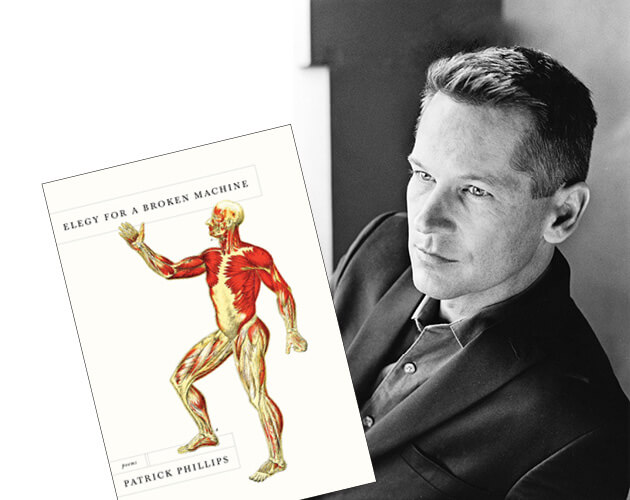Elegy for a Broken Machine: Meditations on Love, Loss, and Brooklyn

Elegy for a Broken Machine
Poet Patrick Phillips’s latest collection of poems, Elegy for a Broken Machine, first crossed our desks a few weeks ago, and we were immediately taken by Phillips’s elegant meditations on everything from an abandoned mattress to the not oft-spoken of beauty of Sunset Park to the way a childhood game of Mercy can connect generations of a family. We spoke with Phillips in advance of his reading and Q&A at BookCourt this Friday about his book, the poet’s life in Brooklyn, and his thoughts on poems in the subway.
Your latest collection of poems Elegy for a Broken Machine focuses on themes of loss and love, without ever veering into nostalgia or cliche. I suppose my question is: How do you do that?
The short answer is that you throw away a lot of bad poems! I certainly wrote a lot of cliche lines, and whole poems that failed for the same reason, but I try be honest with myself about what works and what doesn’t, and ruthless about cutting things that fall back on cliche, and therefore say nothing new. Writing a book focused on love and loss, as you say, risks sappiness, so even if one composes like a bridesmaid, as the saying goes, you still have to revise like a divorce attorney.
Does it take a poet to see the beauty in something like an abandoned mattress, left curbside, or is that an ability that we all have, even if we don’t realize it?
It’s pretty hard to find beauty in an old mattress being shoved into the back of a garbage truck! But writing a love poem about that kind of fits my sick sense of humor. And I’m always most interested in“mixed emotions.” So even as my wife and I wrestled the hideous thing out to the curb, I couldn’t help thinking of how a bed is the very center of a marriage—like Odysseus and Penelope’s bed in The Odyssey, carved from a tree still rooted through the floor.
I don’t know that poets are the only ones who dwell on such moments, but we do spend our days trying to use precise words to describe the world’s dizzying complexities. For me, insight usually comes not prior to a poem, but during it. Nine times out of ten a line I like comes not from inspiration but sweat, and all the rotten drafts that came before.
Brooklyn has a long tradition of being the home to great poets; how do you feel like a part of that tradition?
I live in Clinton Hill, only a few blocks from Ryerson and Myrtle, where Walt Whitman used to live with his mother, and where he used to walk home after crossing the East River. If I want to feel a part of Brooklyn’s poetic tradition, all I have to do is recite those lines from “Crossing Brooklyn Ferry,” as I walk along the same streets Whitman knew:
What is it then between us?
What is the count of the scores or hundreds of years between us?
Whatever it is, it avails not—distance avails not, and place avails not,
I too lived, Brooklyn of ample hills was mine,
I too walk’d the streets of Manhattan island…
I am also surrounded in Brooklyn by a lot of contemporary poets whose work I love and admire, and while tradition is inspirational, so is cameraderie and true friendship.
Does something about Brooklyn lend itself to being inspirational to poets/writers in general?
Compared to Manhattan, Brooklyn is cheap enough for poets and all sorts of other interesting people to live and eat. In spite of our Romantic image of the dour, brooding poet, I find living and being happy in “Brooklyn of ample hills” very inspirational; it is a place humming with life, and whatever its hassles and tensions, it has the great virtue of almost never being boring.
Last question: How do you feel about “Poetry in Motion,” the poems adorning subway cars?
I have always loved “Poetry in Motion,” and as one of the city’s millions of commuters, I often crane my neck around to find those posters at the ends of the subway cars, in hopes of discovering some new poem to add to my pantheon. I’m an even bigger fan since my poem “Heaven” appeared in the series, and I learned just how many people the program reaches.
Since “Heaven” went up in the subways I have gotten emails every few days from folks who saw the poem and felt something after they read it… people who recognize those emotions about the past, or who grieve their own lost loves. That has been very heartening, so whenever I can I sing the praises of Alice Quinn and everyone at the Poetry Society of America and the MTA for helping bring poems, one by one, back into our lives.
Patrick Phillips will be appearing at BookCourt this Friday, March 20 at 7pm; for more info, visit here.
You might also like 




















